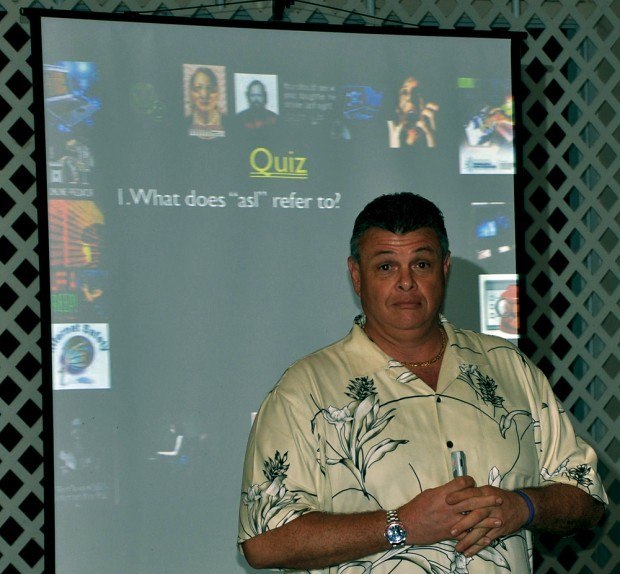LIHU‘E — Pos, asl, lmirl. No, it’s not a typo. This is the hidden language of texting and it is what children prefer to communicate with because “parents can’t hear” it, said Detective Mark Middleton of the Marin County Sheriff’s
LIHU‘E — Pos, asl, lmirl. No, it’s not a typo. This is the hidden language of texting and it is what children prefer to communicate with because “parents can’t hear” it, said Detective Mark Middleton of the Marin County Sheriff’s Department.
LIHU‘E — Pos, asl, lmirl.
No, it’s not a typo. This is the hidden language of texting and it is what children prefer to communicate with because “parents can’t hear” it, said Detective Mark Middleton of the Marin County Sheriff’s Department.
“Parent(s) over shoulder,” “age/sex/location” and “let’s meet in real life,” are just three of the many acronyms kids use and parents should become familiar with because of the many sexual predators in cyberspace, he said.
The days of men blatantly baring it all in a trench coat are gone; sexual predators can hide anywhere, Middleton said at Thursday night’s sparsely attended Drug Awareness and Internet Safety Presentation.
“You don’t know where people do certain things,” he said, citing married men as a “big trend” in reference to sexual offenders.
Almost 100 percent of all sexual predators are male, 86 percent are older than 25 and 97 percent act alone, according to Middleton. One in every 25 children will receive an “aggressive sexual solicitation,” like suggesting to meet or offering gifts.
Kids are ideal victims because they are “naturally curious” and are “easily led by adults,” he said. And since “we know a lot of kids are raising themselves” they become especially vulnerable and are often seeking attention and affection.
Plus, everything and anything you post on the Internet is out there forever and can be seen by the entire galaxy whether you are a child or an adult, he said.
“It can affect your future.”
There are 321 million Facebook users — more than the population of the United States — and some 260 million on MySpace.
Every posted photo can be used and “manipulated by anyone,” Middleton said, adding that most social networking sites set an age restriction of 14. Many children simply lie about their age to get around the requirement, he added.
“You never know who you are talking to,” said Middleton, adding that he poses as a 14-year-old girl online when he is trolling for sex offenders.
With 40 million kids using the Internet, some social networking sites are dedicated specifically to young children and even require a membership fee, like Disney’s Club Penguin. But even those are laced with sexual predators, he said. “You think it’s safe,” but pedophiles are lurking.
Staying informed is necessary in reducing a child’s chances of becoming a victim of sexual predation, Middleton said.
Establishing rules for Internet and cell phone use is also important, he said.
“Keep the computer in a common area, not in the children’s room.”
And talk to your kids, because “parent involvement is the key,” he said.


